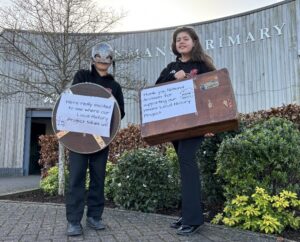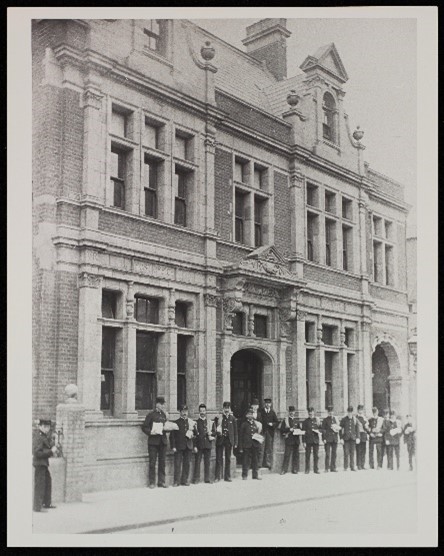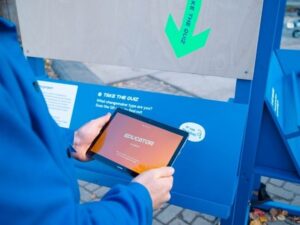Grants awarded 2024
Bedfordshire Archives
The grant will enable the team at Bedfordshire Archives to run a new project called In Step with History. Using a range of records held by Bedfordshire Archives they will research, develop, organise and lead a series of twenty guided walks in five places in the Central Bedfordshire area. The walks will be designed to be accessible and inclusive.
The team will also publish details of this project on their website so that anyone can make use of it for walking or other activities whenever it suits them. Bedfordshire Archives is the record office for the historic county of Bedfordshire, but, being located in the town of Bedford, the team do not always find it easy to engage with those living in Central Bedfordshire. It is their hope that this new way of reaching out to audiences will provide an enjoyable reason to explore a place in a different way, help people to learn more about the history of their place, and inspire them to use the archives to find out more.
Wentworth Woodhouse Trust
 Wentworth Woodhouse, Rotherham, is a Grade I listed mansion and one of the largest houses in Europe, built circa 1725. The house is now owned by the Wentworth Woodhouse Preservation Trust, a registered charity, which exists for the sole purpose of regenerating Wentworth Woodhouse. The house has no original furniture, as the house’s contents were sold in 1948/9.
Wentworth Woodhouse, Rotherham, is a Grade I listed mansion and one of the largest houses in Europe, built circa 1725. The house is now owned by the Wentworth Woodhouse Preservation Trust, a registered charity, which exists for the sole purpose of regenerating Wentworth Woodhouse. The house has no original furniture, as the house’s contents were sold in 1948/9.
The Trust does, however, retain an archive of photographs, letters, books and objects. The content of the archive has, until now, not been widely shared with visitors. The National Archives Engagement Grant will provide a first opportunity for Wentworth Woodhouse to share stories locked in the archives, connecting community and visitors to this historic place.
Victoria Ryves, Head of Culture and Engagement said, “We are really pleased to be awarded Engagement Grant funding. We are excited to experiment with the ways we tell our unique story in the mansion – digitally, creatively and through our archival objects”.
The project will work with research volunteers and a newly formed youth panel to share place-based stories, as well as provide public access to the archive for the first time.
York Business Improvement District
‘Outside the Box’ is a partnership project between York Business Improvement District (BID), York Explore Library and Archives, and York Civic Trust. The project involves celebrating York’s expansive and internationally significant stained-glass archives by transforming 10 BT exchange boxes in York into vibrant works of art.
Rachel Bean, Project Manager at York BID, said: “We’re delighted to have been awarded this grant to help us celebrate the city’s expansive stained-glass archives in a visually impactful and accessible way. The project will bring this collection to life in a whole new way by putting them in the context of place, transforming the look and feel of the street and serving as a permanent reminder of this remarkable art form.”
Inmans Helping Hands
The Hedon Museum and Inmans Primary School are embarking on a collaborative project to develop a bespoke educational package focused on our local area’s history.

Together, the Hedon Museum and Inmans Primary School will create an engaging program that explores the rich heritage of their community. From local events to modern-day events, students will have the opportunity to delve into the area’s past and discover its unique stories.
The partnership are especially excited to explore a project based upon the Great Fire of Hedon and the Pingsdorf Pot.
Under the guidance of museum experts and educators, students of Inmans Primary School will participate in hands-on activities, workshops and immersive experiences designed to spark curiosity and foster a deeper appreciation for history.
This partnership highlights the importance of investing in education and heritage preservation.
Our Year 6 History ambassadors have said, “We just wanted to say a huge thank you to the National Archives for making this happen. We can’t wait to dive into history thanks to you!”
The Story at Mount Oswald
The Story, a brand-new cultural venue and register office for Durham and the wider county opening on 14 June, will be housed in the recently restored Grade II listed Mount Oswald manor house. The house has been extended to incorporate a purpose-built, contemporary building to house five of the county’s historic collections.
The Story will be the new home for Durham County Record Office, with state-of-the-art facilities for users to access collections dating from 1122.
The National Archives Engagement Grant will fund a project – My Neighbourhood Story – telling stories from across the county using the archive collections soon to be held at The Story.
Councillor Elizabeth Scott, Durham County Council’s Cabinet member for economy and partnerships, said: “We are thrilled to receive the National Archives Engagement Grant which will enable us to share our collections with wider and more diverse audiences across County Durham.
“The My Neighbourhood Story project will work with residents in three very different areas of County Durham to tell the stories of the places that hold significance to them, using our archive collections. We anticipate that the impact of the project will be that more people, specifically people who traditionally have not engaged with heritage, will become aware of The Story’s collections, and develop an interest in local history.
“We hope that the project will enable participants to develop a greater understanding of the place that they call home, their own story and place within it, and the significance of their locality in the history of the wider region. We are excited to get started on the project and extend our thanks to the National Archives for their support with this work.”
Essex Record Office

– General Post Office, Weston Road, Southend, c.1900 (Essex Record Office TS 168/56)
This project will explore the history of the D/deaf community in Southend-on-Sea through a series of accessible workshops, co-led by the Essex Record Office (ERO) and the artist Damien Robinson. Historically marginalised and officially discouraged from communicating in their preferred language, D/deaf people have created and repurposed social spaces to gather and connect. Essex Record Office will take the history of two of these spaces – the St Mellitus Centre and The Last Post pub – as a starting point to share, record, and preserve stories of Southend’s D/deaf community.
It is especially important to record these stories now, during a time of change for the St Mellitus Centre and a significant period of D/deaf activism and awareness nationally. The team also hope that the project will be an opportunity for participants to connect to other people and their local area, and for the ERO to better understand potential barriers to engagement with archives.
“The archives held at the Essex Record Office are a hugely important part of the county’s history and I am delighted that we have secured this funding so that we can record and share D/deaf histories which are an important part of the public record.” – Councillor Mark Durham, Cabinet Member for the Arts, Heritage and Culture at Essex County Council
Tower Hamlets Local History Library and Record Office
Tower Hamlets are collaborating with Studio Futurall to deliver a pop-up public engagement activity to connect Tower Hamlets residents with archival material on the local history of changemaking. This project will build on Futurall’s previous work, The Changemaker’s Guide.
 The project uses nine different ‘changemaker’ types, each describing a different way to make change in a local area. Visitors will take a quiz to tell them what kind of changemaker they are, before learning about a historic local changemaker with a similar approach to changing the world. The team believe that when people are more connected to their place, they are more inspired to care for and fight for it; learning about roots fosters belonging.
The project uses nine different ‘changemaker’ types, each describing a different way to make change in a local area. Visitors will take a quiz to tell them what kind of changemaker they are, before learning about a historic local changemaker with a similar approach to changing the world. The team believe that when people are more connected to their place, they are more inspired to care for and fight for it; learning about roots fosters belonging.
